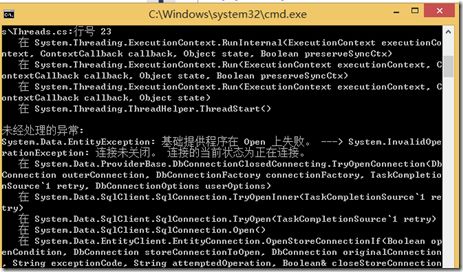- android系统selinux中添加新属性property
辉色投像
1.定位/android/system/sepolicy/private/property_contexts声明属性开头:persist.charge声明属性类型:u:object_r:system_prop:s0图12.定位到android/system/sepolicy/public/domain.te删除neverallow{domain-init}default_prop:property
- swagger访问路径
igotyback
swagger
Swagger2.x版本访问地址:http://{ip}:{port}/{context-path}/swagger-ui.html{ip}是你的服务器IP地址。{port}是你的应用服务端口,通常为8080。{context-path}是你的应用上下文路径,如果应用部署在根路径下,则为空。Swagger3.x版本对于Swagger3.x版本(也称为OpenAPI3)访问地址:http://{ip
- LLM 词汇表
落难Coder
LLMsNLP大语言模型大模型llama人工智能
Contextwindow“上下文窗口”是指语言模型在生成新文本时能够回溯和参考的文本量。这不同于语言模型训练时所使用的大量数据集,而是代表了模型的“工作记忆”。较大的上下文窗口可以让模型理解和响应更复杂和更长的提示,而较小的上下文窗口可能会限制模型处理较长提示或在长时间对话中保持连贯性的能力。Fine-tuning微调是使用额外的数据进一步训练预训练语言模型的过程。这使得模型开始表示和模仿微调数
- Xinference如何注册自定义模型
玩人工智能的辣条哥
人工智能AI大模型Xinference
环境:Xinference问题描述:Xinference如何注册自定义模型解决方案:1.写个model_config.json,内容如下{"version":1,"context_length":2048,"model_name":"custom-llama-3","model_lang":["en","ch"],"model_ability":["generate","chat"],"model
- HarmonyOS Next鸿蒙扫一扫功能实现
JohnLiu_
HarmonyOSNextharmonyos华为扫一扫鸿蒙
直接使用的是华为官方提供的api,封装成一个工具类方便调用。import{common}from'@kit.AbilityKit';import{scanBarcode,scanCore}from'@kit.ScanKit';exportnamespaceScanUtil{exportasyncfunctionstartScan(context:common.Context):Promise{if
- golang 实现文件上传下载
wangwei830
go
Gin框架上传下载上传(支持批量上传)httpRouter.POST("/upload",func(ctx*gin.Context){forms,err:=ctx.MultipartForm()iferr!=nil{fmt.Println("error",err)}files:=forms.File["fileName"]for_,v:=rangefiles{iferr:=ctx.SaveUplo
- 360前端星计划-动画可以这么玩
马小蜗
动画的基本原理定时器改变对象的属性根据新的属性重新渲染动画functionupdate(context){//更新属性}constticker=newTicker();ticker.tick(update,context);动画的种类1、JavaScript动画操作DOMCanvas2、CSS动画transitionanimation3、SVG动画SMILJS动画的优缺点优点:灵活度、可控性、性能
- JavaScript中秋快乐!
Q_w7742
javascript开发语言ecmascript
我们来实现一个简单的祝福网页~主要的难度在于使用canvas绘图当点击canvas时候,跳出“中秋节快乐”字样,需要注册鼠标单击事件和计时器。首先定义主要函数:初始化当点击canvas之后转到onCanvasClick函数,绘图生成灯笼。functiononCanvasClick(){//事件处理函数context.clearRect(0,0,canvas1.width,canvas1.heigh
- golang学习笔记--MPG模型
xxzed
golang#学习笔记学习笔记golang
MPG模式:M(Machine):操作系统的主线程P(Processor):协程执行需要的资源(上下文context),可以看作一个局部的调度器,使go代码在一个线程上跑,他是实现从N:1到N:M映射的关键G(Goroutine):协程,有自己的栈。包含指令指针(instructionpointer)和其它信息(正在等待的channel等等),用于调度。一个P下面可以有多个G1、当前程序有三个M,
- java获取applicationcontext,SpringBoot获取ApplicationContext的3种方式
花儿街参考
ApplicationContext是什么?简单来说就是Spring中的容器,可以用来获取容器中的各种bean组件,注册监听事件,加载资源文件等功能。ApplicationContext获取的几种方式1直接使用Autowired注入@ComponentpublicclassBook1{@AutowiredprivateApplicationContextapplicationContext;pub
- 使用ffmpeg将pcm格式音频转化为mp3格式音频
布丁小站
ffmpegpcm音视频
voidAudioCode::ENcode(AVCodecContext*cdc_ctx,AVFrame*frame,AVPacket*pkt){intret=0;/*sendtheframeforencoding*/ret=avcodec_send_frame(cdc_ctx,frame);if(ret=0){ret=avcodec_receive_packet(cdc_ctx,pkt);if(
- SpringBoot 获取 ApplicationContext
loveLifeLoveCoding
springbootspringbootjavaspring
1.概念ApplicationContext是什么?简单来说就是Spring中的容器,可以用来获取容器中的各种bean组件,注册监听事件,加载资源文件等功能2.获取ApplicationContext的方式2.1.创建工具类通过此工具类,可以方便的获取bean组件,获取配置信息等importorg.springframework.beans.BeansException;importorg.spr
- spring整合hibernate最基础的方式
木木ainiks
hibernatespringjava
1创建文件,可以创建web文件目录2导入jar包,需要导全,我就是jar没导全,后面怎么运行都不对3配置applicationContext.xml<beanid="sessionFactory"
- Pyqt5实现listwidget自定义右键菜单
Saudade957
pyqt5前端前端python编程语言
Pyqt5实现listwidget自定义右键菜单基于网上搜到的各种教程失败以后(ps:可能有的可以成功,但是我都没成功),组合了一下一些代码最终成功实现相关内容。首先在ui文件生成的py文件中添加self.listWidget.setContextMenuPolicy(Qt.CustomContextMenu)self.listWidget.customContextMenuRequested.c
- FPGA随记——赛灵思OOC功能
一口一口吃成大V
FPGA随记fpga开发
在这里,我们简要介绍一下Vivado的OOC(Out-of-Context)综合的概念。对于顶层设计,Vivado使用自顶向下的全局(Global)综合方式,将顶层之下的所有逻辑模块都进行综合,但是设置为OOC方式的模块除外,它们独立于顶层设计而单独综合。通常,在整个设计周期中,顶层设计会被多次修改并综合。但有些子模块在创建完毕之后不会因为顶层设计的修改而被修改,如IP,它们被设置为OOC综合方式
- SharedPreferences
hdychi
一、简介在Android中,主要有以下几种存储方式:1、SharedPreferences,在键值对中存储私有原始数据。2、内部存储,在设备内存中存储私有数据。官方示例:StringFILENAME="hello_file";Stringstring="helloworld!";FileOutputStreamfos=openFileOutput(FILENAME,Context.MODE_PRI
- 使用Fleet AI Context和LangChain构建高效的文档检索系统
afTFODguAKBF
人工智能langchainpython
使用FleetAIContext和LangChain构建高效的文档检索系统引言在当今的AI和机器学习领域,高质量的文档检索系统对于提高开发效率和用户体验至关重要。本文将介绍如何利用FleetAIContext提供的高质量embeddings和LangChain框架来构建一个强大的文档检索系统。我们将深入探讨如何处理嵌入向量、检索相关文档,以及如何将这些功能整合到一个简单但功能强大的代码生成链中。主
- 微服务分布式架构中,如何实现日志链路跟踪?
2401_84048542
程序员架构微服务分布式
MDC(MappedDiagnosticContext,映射调试上下文)是log4j和logback提供的一种方便在多线程条件下记录日志的功能。MDC可以看成是一个与当前线程绑定的Map,可以往其中添加键值对。MDC中包含的内容可以被同一线程中执行的代码所访问。当前线程的子线程会继承其父线程中的MDC的内容。当需要记录日志时,只需要从MDC中获取所需的信息即可。MDC的内容则由程序在适当的时候保存
- Cuda 程序编译报错: fatal error: cusparse.h: No such file or directory
原野寻踪
实践经验cuda
编译cuda程序时发现下列报错:/mnt/xxx/miniconda3/envs/xxx/lib/python3.8/site-packages/torch/include/ATen/cuda/CUDAContext.h:6:10:fatalerror:cusparse.h:Nosuchfileordirectory#include^~~~~~~~~~~~检查发现是选择了错误的Cuda版本。ls/
- QLable提升类
入梦游
qt
实现:1.图片移动、保持纵横比缩放、右键菜单1.myLabel.h#ifndefMYLABEL_H#defineMYLABEL_H#includeclassMyLabel:publicQLabel{Q_OBJECTpublic:MyLabel(QWidget*parent=nullptr);private:voidcontextMenuEvent(QContextMenuEvent*e)overr
- 说说你对koa中洋葱模型的理解?
J轩
前端
什么是koa?Koa是一个精简的node框架,被认为是第二代Node框架,其最大的特点就是独特的中间件流程控制,是一个典型的洋葱模型,它的核心工作包括下面两个方面:1.将node原生的req和res封装成为一个context对象。2.基于async/await的中间件洋葱模型机制。Koa1和Koa2在源码上的区别有何不同?Koa1是使用generator、yield的模式。Koa2使用的是asyn
- HTML5(六)canvas 矩形、路径、画板功能
祝名
一.绘制矩形1.什么是canvascanvas标签相当于一个画板;canvas的宽高不要用css去定义,直接在标签中用属性写;2.obj=c.getContext('2d');获得2d绘画环境(相当于铺了一层画布)绘画图像的操作都会在obj这个绘画环境中存储;3.绘画方法及样式x,y为坐标样例:二.canvas路径1.方法2.样例cv.lineJoin='round';//边界类型为弧形三.画板功
- unable to prepare context: path “.\r“ not found
嘟嘟 嘟嘟嘟
执行sh脚本的时候,报标题错误原因是脚本是在Windows上编辑,然后上传到Linux上执行。好像是2个系统编码不一样导致的vim打开脚本进入命令行输入setff=unix再保存退出即可
- 【SpringBoot】自定义监听器
女汉纸一枚
java
前言可以通过自定义监听器,监听系统中的某些事件,在某些系统事件执行之后,触发自己业务内容执行。内容第一种实现ApplicationListener接口,spring.factories内填写接口实现,key值为org.springframework.context.ApplicationListenerpackagecom.mooc.sb2.listener;importorg.springfra
- 深入探究Spring Framework源码与核心组件
纸寿司
本文还有配套的精品资源,点击获取简介:SpringFramework是Java开发中广泛使用的框架,其源码的阅读和理解对于开发者来说是宝贵的学习资源。本文将介绍依赖注入、ApplicationContext、Bean生命周期、AOP、数据访问集成、MVC模式、注解驱动开发、测试支持、SpringBoot以及SpringCloud等关键概念。通过这些核心组件的学习,可以更好地掌握Spring的高级功
- SpringBoot : SpringBoot自定义的ApplicationContext实现类
九师兄
框架-springboot
文章目录1.美图2.概述3.在传统spring框架下的扩展方式4.探寻SpringBoot框架下的扩展方式5.如何设置自定义的ApplicationContext实现类6.实战使用自定义的ApplicationContext实现类1.美图2.概述在学习spring容器初始化的过程中,发现spring容器预留了一些扩展点,我们可以写子类来做功能扩展,例如AbstractApplicationCont
- 深入探究 Spring 的扫描原理
小园子的小菜
javaspringjavamysql
在Spring框架中,扫描机制是其核心功能之一,它负责在应用程序启动时自动发现和注册相关的组件。本文将深入探讨Spring的扫描原理,包括扫描过程以及相关源码的分析。spring提供了两种扫描方式来进行扫描:1.我们可以通过AnnotationConfigApplicationContext的scan方法中进行设置固定的包名路径;2.我们可以通过@ComponentScan注解来进行配置要进行扫描
- Redis基于Geo的地理位置操作
当归. z Z
Redisredis数据库缓存
packagecom.example.redis;importorg.junit.jupiter.api.Test;importorg.springframework.beans.factory.annotation.Autowired;importorg.springframework.boot.test.context.SpringBootTest;importorg.springframew
- 纯js简易五子棋
敬@过往
javascript前端开发语言
一、利用canvas绘制五子棋(代码较为简陋请见谅)这里单独拿出一个绘制好的黑色五子棋展示五子棋-------------人生如棋,落子无悔!!!constcanvas=document.createElement('canvas');canvas.width=900;canvas.height=900;document.body.append(canvas);constcontext=canva
- web.xml and server.xml-03-11
封_绝
web.xml加载顺序:ServletContext→context-param→listener→filter→servletserver.xmlAJP服务器群集热部署:不需要每次做修改都重启服务器,//下//如果该路径下没有项目,则会报错(其余项目依旧会正常加载),如果是使用冷部署则不会报错?idea中的设置如下:image.png
- tomcat基础与部署发布
暗黑小菠萝
Tomcat java web
从51cto搬家了,以后会更新在这里方便自己查看。
做项目一直用tomcat,都是配置到eclipse中使用,这几天有时间整理一下使用心得,有一些自己配置遇到的细节问题。
Tomcat:一个Servlets和JSP页面的容器,以提供网站服务。
一、Tomcat安装
安装方式:①运行.exe安装包
&n
- 网站架构发展的过程
ayaoxinchao
数据库应用服务器网站架构
1.初始阶段网站架构:应用程序、数据库、文件等资源在同一个服务器上
2.应用服务和数据服务分离:应用服务器、数据库服务器、文件服务器
3.使用缓存改善网站性能:为应用服务器提供本地缓存,但受限于应用服务器的内存容量,可以使用专门的缓存服务器,提供分布式缓存服务器架构
4.使用应用服务器集群改善网站的并发处理能力:使用负载均衡调度服务器,将来自客户端浏览器的访问请求分发到应用服务器集群中的任何
- [信息与安全]数据库的备份问题
comsci
数据库
如果你们建设的信息系统是采用中心-分支的模式,那么这里有一个问题
如果你的数据来自中心数据库,那么中心数据库如果出现故障,你的分支机构的数据如何保证安全呢?
是否应该在这种信息系统结构的基础上进行改造,容许分支机构的信息系统也备份一个中心数据库的文件呢?
&n
- 使用maven tomcat plugin插件debug关联源代码
商人shang
mavendebug查看源码tomcat-plugin
*首先需要配置好'''maven-tomcat7-plugin''',参见[[Maven开发Web项目]]的'''Tomcat'''部分。
*配置好后,在[[Eclipse]]中打开'''Debug Configurations'''界面,在'''Maven Build'''项下新建当前工程的调试。在'''Main'''选项卡中点击'''Browse Workspace...'''选择需要开发的
- 大访问量高并发
oloz
大访问量高并发
大访问量高并发的网站主要压力还是在于数据库的操作上,尽量避免频繁的请求数据库。下面简
要列出几点解决方案:
01、优化你的代码和查询语句,合理使用索引
02、使用缓存技术例如memcache、ecache将不经常变化的数据放入缓存之中
03、采用服务器集群、负载均衡分担大访问量高并发压力
04、数据读写分离
05、合理选用框架,合理架构(推荐分布式架构)。
- cache 服务器
小猪猪08
cache
Cache 即高速缓存.那么cache是怎么样提高系统性能与运行速度呢?是不是在任何情况下用cache都能提高性能?是不是cache用的越多就越好呢?我在近期开发的项目中有所体会,写下来当作总结也希望能跟大家一起探讨探讨,有错误的地方希望大家批评指正。
1.Cache 是怎么样工作的?
Cache 是分配在服务器上
- mysql存储过程
香水浓
mysql
Description:插入大量测试数据
use xmpl;
drop procedure if exists mockup_test_data_sp;
create procedure mockup_test_data_sp(
in number_of_records int
)
begin
declare cnt int;
declare name varch
- CSS的class、id、css文件名的常用命名规则
agevs
JavaScriptUI框架Ajaxcss
CSS的class、id、css文件名的常用命名规则
(一)常用的CSS命名规则
头:header
内容:content/container
尾:footer
导航:nav
侧栏:sidebar
栏目:column
页面外围控制整体布局宽度:wrapper
左右中:left right
- 全局数据源
AILIKES
javatomcatmysqljdbcJNDI
实验目的:为了研究两个项目同时访问一个全局数据源的时候是创建了一个数据源对象,还是创建了两个数据源对象。
1:将diuid和mysql驱动包(druid-1.0.2.jar和mysql-connector-java-5.1.15.jar)copy至%TOMCAT_HOME%/lib下;2:配置数据源,将JNDI在%TOMCAT_HOME%/conf/context.xml中配置好,格式如下:&l
- MYSQL的随机查询的实现方法
baalwolf
mysql
MYSQL的随机抽取实现方法。举个例子,要从tablename表中随机提取一条记录,大家一般的写法就是:SELECT * FROM tablename ORDER BY RAND() LIMIT 1。但是,后来我查了一下MYSQL的官方手册,里面针对RAND()的提示大概意思就是,在ORDER BY从句里面不能使用RAND()函数,因为这样会导致数据列被多次扫描。但是在MYSQL 3.23版本中,
- JAVA的getBytes()方法
bijian1013
javaeclipseunixOS
在Java中,String的getBytes()方法是得到一个操作系统默认的编码格式的字节数组。这个表示在不同OS下,返回的东西不一样!
String.getBytes(String decode)方法会根据指定的decode编码返回某字符串在该编码下的byte数组表示,如:
byte[] b_gbk = "
- AngularJS中操作Cookies
bijian1013
JavaScriptAngularJSCookies
如果你的应用足够大、足够复杂,那么你很快就会遇到这样一咱种情况:你需要在客户端存储一些状态信息,这些状态信息是跨session(会话)的。你可能还记得利用document.cookie接口直接操作纯文本cookie的痛苦经历。
幸运的是,这种方式已经一去不复返了,在所有现代浏览器中几乎
- [Maven学习笔记五]Maven聚合和继承特性
bit1129
maven
Maven聚合
在实际的项目中,一个项目通常会划分为多个模块,为了说明问题,以用户登陆这个小web应用为例。通常一个web应用分为三个模块:
1. 模型和数据持久化层user-core,
2. 业务逻辑层user-service以
3. web展现层user-web,
user-service依赖于user-core
user-web依赖于user-core和use
- 【JVM七】JVM知识点总结
bit1129
jvm
1. JVM运行模式
1.1 JVM运行时分为-server和-client两种模式,在32位机器上只有client模式的JVM。通常,64位的JVM默认都是使用server模式,因为server模式的JVM虽然启动慢点,但是,在运行过程,JVM会尽可能的进行优化
1.2 JVM分为三种字节码解释执行方式:mixed mode, interpret mode以及compiler
- linux下查看nginx、apache、mysql、php的编译参数
ronin47
在linux平台下的应用,最流行的莫过于nginx、apache、mysql、php几个。而这几个常用的应用,在手工编译完以后,在其他一些情况下(如:新增模块),往往想要查看当初都使用了那些参数进行的编译。这时候就可以利用以下方法查看。
1、nginx
[root@361way ~]# /App/nginx/sbin/nginx -V
nginx: nginx version: nginx/
- unity中运用Resources.Load的方法?
brotherlamp
unity视频unity资料unity自学unityunity教程
问:unity中运用Resources.Load的方法?
答:Resources.Load是unity本地动态加载资本所用的方法,也即是你想动态加载的时分才用到它,比方枪弹,特效,某些实时替换的图像什么的,主张此文件夹不要放太多东西,在打包的时分,它会独自把里边的一切东西都会集打包到一同,不论里边有没有你用的东西,所以大多数资本应该是自个建文件放置
1、unity实时替换的物体即是依据环境条件
- 线段树-入门
bylijinnan
java算法线段树
/**
* 线段树入门
* 问题:已知线段[2,5] [4,6] [0,7];求点2,4,7分别出现了多少次
* 以下代码建立的线段树用链表来保存,且树的叶子结点类似[i,i]
*
* 参考链接:http://hi.baidu.com/semluhiigubbqvq/item/be736a33a8864789f4e4ad18
* @author lijinna
- 全选与反选
chicony
全选
<!DOCTYPE HTML PUBLIC "-//W3C//DTD HTML 4.01 Transitional//EN" "http://www.w3.org/TR/html4/loose.dtd">
<html>
<head>
<title>全选与反选</title>
- vim一些简单记录
chenchao051
vim
mac在/usr/share/vim/vimrc linux在/etc/vimrc
1、问:后退键不能删除数据,不能往后退怎么办?
答:在vimrc中加入set backspace=2
2、问:如何控制tab键的缩进?
答:在vimrc中加入set tabstop=4 (任何
- Sublime Text 快捷键
daizj
快捷键sublime
[size=large][/size]Sublime Text快捷键:Ctrl+Shift+P:打开命令面板Ctrl+P:搜索项目中的文件Ctrl+G:跳转到第几行Ctrl+W:关闭当前打开文件Ctrl+Shift+W:关闭所有打开文件Ctrl+Shift+V:粘贴并格式化Ctrl+D:选择单词,重复可增加选择下一个相同的单词Ctrl+L:选择行,重复可依次增加选择下一行Ctrl+Shift+L:
- php 引用(&)详解
dcj3sjt126com
PHP
在PHP 中引用的意思是:不同的名字访问同一个变量内容. 与C语言中的指针是有差别的.C语言中的指针里面存储的是变量的内容在内存中存放的地址 变量的引用 PHP 的引用允许你用两个变量来指向同一个内容 复制代码代码如下:
<?
$a="ABC";
$b =&$a;
echo
- SVN中trunk,branches,tags用法详解
dcj3sjt126com
SVN
Subversion有一个很标准的目录结构,是这样的。比如项目是proj,svn地址为svn://proj/,那么标准的svn布局是svn://proj/|+-trunk+-branches+-tags这是一个标准的布局,trunk为主开发目录,branches为分支开发目录,tags为tag存档目录(不允许修改)。但是具体这几个目录应该如何使用,svn并没有明确的规范,更多的还是用户自己的习惯。
- 对软件设计的思考
e200702084
设计模式数据结构算法ssh活动
软件设计的宏观与微观
软件开发是一种高智商的开发活动。一个优秀的软件设计人员不仅要从宏观上把握软件之间的开发,也要从微观上把握软件之间的开发。宏观上,可以应用面向对象设计,采用流行的SSH架构,采用web层,业务逻辑层,持久层分层架构。采用设计模式提供系统的健壮性和可维护性。微观上,对于一个类,甚至方法的调用,从计算机的角度模拟程序的运行情况。了解内存分配,参数传
- 同步、异步、阻塞、非阻塞
geeksun
非阻塞
同步、异步、阻塞、非阻塞这几个概念有时有点混淆,在此文试图解释一下。
同步:发出方法调用后,当没有返回结果,当前线程会一直在等待(阻塞)状态。
场景:打电话,营业厅窗口办业务、B/S架构的http请求-响应模式。
异步:方法调用后不立即返回结果,调用结果通过状态、通知或回调通知方法调用者或接收者。异步方法调用后,当前线程不会阻塞,会继续执行其他任务。
实现:
- Reverse SSH Tunnel 反向打洞實錄
hongtoushizi
ssh
實際的操作步驟:
# 首先,在客戶那理的機器下指令連回我們自己的 Server,並設定自己 Server 上的 12345 port 會對應到幾器上的 SSH port
ssh -NfR 12345:localhost:22
[email protected]
# 然後在 myhost 的機器上連自己的 12345 port,就可以連回在客戶那的機器
ssh localhost -p 1
- Hibernate中的缓存
Josh_Persistence
一级缓存Hiberante缓存查询缓存二级缓存
Hibernate中的缓存
一、Hiberante中常见的三大缓存:一级缓存,二级缓存和查询缓存。
Hibernate中提供了两级Cache,第一级别的缓存是Session级别的缓存,它是属于事务范围的缓存。这一级别的缓存是由hibernate管理的,一般情况下无需进行干预;第二级别的缓存是SessionFactory级别的缓存,它是属于进程范围或群集范围的缓存。这一级别的缓存
- 对象关系行为模式之延迟加载
home198979
PHP架构延迟加载
形象化设计模式实战 HELLO!架构
一、概念
Lazy Load:一个对象,它虽然不包含所需要的所有数据,但是知道怎么获取这些数据。
延迟加载貌似很简单,就是在数据需要时再从数据库获取,减少数据库的消耗。但这其中还是有不少技巧的。
二、实现延迟加载
实现Lazy Load主要有四种方法:延迟初始化、虚
- xml 验证
pengfeicao521
xmlxml解析
有些字符,xml不能识别,用jdom或者dom4j解析的时候就报错
public static void testPattern() {
// 含有非法字符的串
String str = "Jamey친ÑԂ
- div设置半透明效果
spjich
css半透明
为div设置如下样式:
div{filter:alpha(Opacity=80);-moz-opacity:0.5;opacity: 0.5;}
说明:
1、filter:对win IE设置半透明滤镜效果,filter:alpha(Opacity=80)代表该对象80%半透明,火狐浏览器不认2、-moz-opaci
- 你真的了解单例模式么?
w574240966
java单例设计模式jvm
单例模式,很多初学者认为单例模式很简单,并且认为自己已经掌握了这种设计模式。但事实上,你真的了解单例模式了么。
一,单例模式的5中写法。(回字的四种写法,哈哈。)
1,懒汉式
(1)线程不安全的懒汉式
public cla

